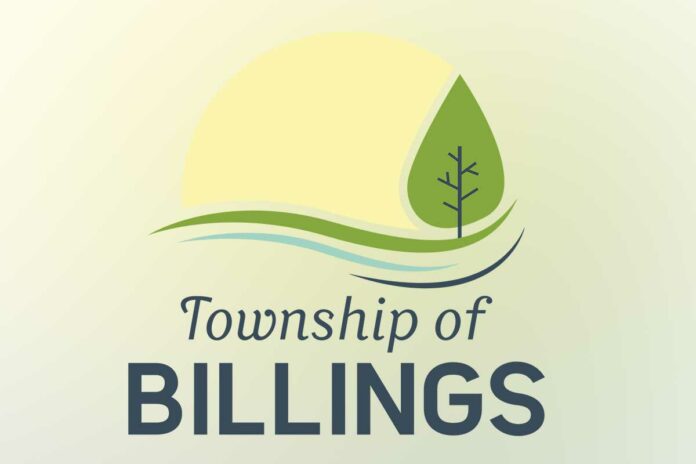LITTLE CURRENT—Representatives of the three Island police services and key administrators of the Manitoulin Health Centre gathered in the hospital’s Little Current board room Thursday, January 18 to sign a Memorandum of Agreement (MOA) ensuring key communication takes place between responding officers and health providers when an individual presents to the hospital while experiencing a mental health crisis.
Police services taking part in the signing were the Manitoulin OPP detachment, UCCM Anishnaabe Police Service and the Wikwemikong Tribal Police Service, while on the Manitoulin Health Centre side CEO Paula Fields, VP Clinical Services and Chief Nursing Officer Paula Ferguson and Director of Strategy and Integration Melanie Stephens.
“I am very appreciative to the OPP for bringing this initiative forward and including all police services in the Manitoulin district,” said MHC CEO Paula Fields. “The processes within the MOA will improve communication and safety for our hospital employees and police services, as well as the patient experience and transitions of our patients suffering with mental health and/or addictions. I look forward to future collaborations and initiatives with local police services that support our employees in the work they do and improving the services we provide to our patients. It is very evident that we are all striving to provide the best care possible to those we serve.”
“This transition protocol is an important step forward in ensuring the best possible service to those experiencing a mental health crisis,” said Manitoulin OPP Detachment Commander Inspector Robert Walsh. “Through the clarification of roles and establishment of clear parameters around the transfer of care, police and hospital can expedite the transition process while ensuring the safety of both public and staff.”
“UCCM Anishnaabe Police recognizes and looks forward to working in collaboration with our local police partners, the OPP and Wikwemikong Tribal Police Service and our partner agency, MHC,” said UCCM Police Chief James Killeen. “This collaborative effort will collectively solve problems and improve the quality of care for patients that come in joint contact with police and health care personnel at the same time. This MOA will increase safety for health care workers, police personnel and our most important stakeholders, the citizens we serve.”
“Wikwemikong Tribal Police Service appreciates the efforts and co-operation of all parties who created this important Memorandum of Agreement,” said WTPS Police Chief Staff Sergeant Gregory Mishibinijima. “The police, health and government signatories to the MOA are all committed to improving the health and safety of persons involved in mental health care on Manitoulin. We are especially encouraged by the commitment to training of WTPS officers and their policing partners. We look forward to an improvement of services to patients in our communities.”
“This is an initiative that was spearheaded by the OPP and is being implemented across the province,” said Ms. Fields. “We are fortunate that the WTPS and UCCM police collaborate well with the OPP and recognized the importance of this initiative.”
Ms. Fields noted the team actually started work on the MOA in 2018, but due to changes in leadership and the pandemic the work was delayed.
“Chantal Dupuis, provincial mental health lead/program analyst with the Ministry of the Solicitor General from the OPP led the project and worked with the group,” said Ms. Fields.
The protocol is designed to enhance collaboration between hospitals and the police services with the purpose of improving outcomes for individuals that have been apprehended by police officers under the Mental Health Act and subsequently accompanied to the nearest hospital emergency department for medical clearance, mental health assessment and care.
The intent of the protocol is to 1) improve outcomes for individuals apprehended by police under the Mental Health Act, while respecting individuals rights, including the right to privacy; 2) improve transitions between police officers and hospital workers; and 3) improve coordination and collaboration among partners involved in the transition.
The protocol provides for the possibility of extension to include partnerships with other key stakeholders in the community, such as paramedic services, community-based mental health and addiction agencies, peer and family support agencies, child and youth mental health and addictions agencies as appropriate.
The protocol was developed in collaboration with key stakeholders who are the first responders to individuals experiencing a mental health and/or addictions-related crisis. The document therefore “reflects the strong commitment of all participants to provide an effective and integrated response to such crisis situations in the District of Manitoulin.”
The stated objectives are to: “improve outcomes for people experiencing a mental health or addictions-related crisis that are accompanied to an emergency department by a police officer, while respecting the individual rights, including the right to privacy; to decrease police officer wait times to transfer custody of apprehended individual to hospital emergency department; to protect health care worker safety and security through system improvements; to provide a common approach to communication between police and Manitoulin Health Centre staff to ensure safe, effective decision making related to known risk during the transition from police to hospital; and to promote public safety.”
Following the official announcement and signing of the MOA, the signatories and other key staff met in private to discuss in detail how the protocols would be enacted in practice.





